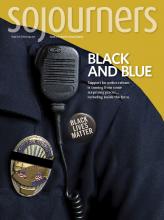I SERVED FIVE years as a U.S. Army reserve chaplain. This spring I submitted my resignation to the president of the United States. I refuse to support U.S. policies on armed drones, nuclear weapons, and the policy of “preventive war.” I told the president, “I refuse to serve as an empire chaplain.”
I grew up skeptical of military solutions and decided not to register for the Selective Service System when I turned 18. How, then, did I end up in the Army?
The call to bring my religious values of justice and compassion into the Army chaplaincy came in response to three realities: soldiers burdened by multiple deployments, a military replete with uniformed evangelicals occupying Muslim lands, and the torture at Abu Ghraib.
As chaplain I was pastor: nurturing the living, caring for the wounded, and honoring the dead. However, I also claimed the prophetic biblical imperative to “speak truth to power.”
When I witnessed drone warfare in Afghanistan, my anguish peaked. In 2012, I preached a sermon titled “A Veterans Day Confession for America” lamenting drone killing and “preventive war.” Military commanders reacted harshly. I was discharged with a reprimand and negative evaluation. I learned that U.S. military chaplains are not allowed to have a prophetic voice; they are expected to be nothing more than empire chaplains.
Read the Full Article

